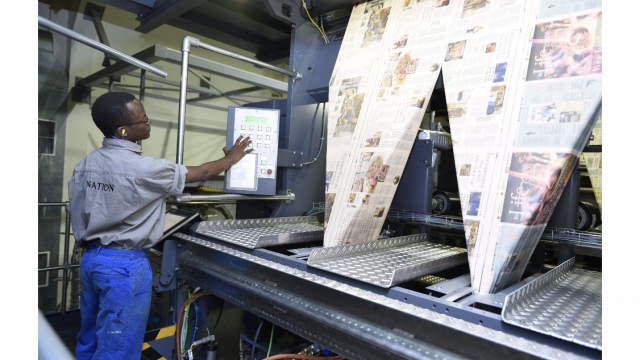Nation Media Group Printing Plant has documented an environmental policy that is committed to managing its operations in order to minimize the impact of processes and activities carried out at the plant on the natural environment. The main activities carried out at the Printing Plant are printing and distribution of Nation Media Group’s publications and warehousing of raw materials used in printing. Of these processes, printing of the publications has the highest potential to negatively impact the natural environment.
The plant abides by legal and regulatory framework that relates to environmental pollution and degradation. These are enforced by National Environmental Authority (NEMA), a government body and the local county government.
Green energy
Green energy is the energy derived from natural sources such as sunlight, wind, rain, plants, geothermal etc. All these energy sources are part and parcel of nature hence do not account for pollution at all. Factories worldwide use oil and gas to support the working of the industrial machinery. The burning of oil and gas releases harmful gases in the air like carbon monoxide and carbon dioxide which pollute the air.
To reduce the amount of electrical power consumed within the plant, the new plant design has embraced green energy solutions by incorporating solar energy. Half of the street lights within the compound use renewable solar energy. The design of the press hall and the mailroom section requires the use of energy during the day and night. To reduce reliance on electricity from Kenya Power, a day lighting solution employing use of 12 solatubes rated at 400 Watts each, has been installed in the mailroom and another 12 in the press hall. Using solar energy, these solatubes provide enough light for use during the day. Solar energy that is therefore effectively used in the production section.
Waste Management
Waste management refers to all the activities and actions required to manage waste from its inception to its final disposal. This includes amongst other things, collection, transport, and disposal of waste together with monitoring and regulation. It also encompasses the legal and regulatory framework that relates to waste management.
The production process at the NMG Printing Plant generates various types of waste from printing and maintenance activities, cardboard/packaging waste, chemical waste, paper waste of various types, waste oils, office waste, scrap plates and blankets. Sewer waste is also included.
The plant has a waste management system which continuously monitors and controls waste in order to reduce its impact on the environment and adhere to regulatory and legal requirements. This system relates to the production, handling, safe storage, collection and disposal of all waste generated in the production processes.
Waste identification
Waste is identified from source and appropriate bins and storage locations have been identified for disposal. Newsprint goes through the production cycle – storage, handling, printing, packaging and distribution – before it becomes a newspaper sold to a reader. However, not all the newsprint purchased becomes newspapers sold. In production, this discrepancy between newsprint purchased and newspapers sold is treated as waste. Newsprint waste is generally non-hazardous waste and occurs at various stages of the production cycle. Other waste is also generated during the printing, maintenance and other related processes.
In order to prevent pollution of the environment, the NMG Printing Plant has engaged licenced partners who collect all the waste generated for safe transportation and disposal.
Waste Evaluation
Any waste that is generated in the above processes is evaluated to determine the category it falls under. This is the responsibility of the generator of the waste, who determines the most appropriate method of handling and safe storage.
Waste Disposal
Disposal of all paper waste generated within the printing plant including newspapers returned unsold and other solid waste is contracted to two companies. While one company resells to other paper recyclers, another collects other office paper waste, used rags and kitchen waste and dumps at the Nairobi County waste disposal site in Dandora. These companies have been licenced by NEMA to undertake this disposal.
All chemical waste from the pre-press and printing process including used oil and inks is channeled to a purpose built underground solvent tank within the plant compound which is exhausted by a contracted company. This is to ensure that this hazardous waste does not find its way into the domestic sewer, endangering aquatic life.

